You can effectively eliminate garden pests using essential oils like peppermint, clove, and lavender, which contain powerful compounds that disrupt insects’ nervous systems and overwhelm their ability to locate your plants. Peppermint oil’s menthol creates barriers against aphids and flies, while clove oil’s eugenol delivers direct insecticidal action. Lavender repels squash bugs and whiteflies while attracting beneficial pollinators. Combining these oils with proper dilution ratios and strategic application timing will transform your pest management approach.
Understanding How Essential Oils Repel Garden Pests
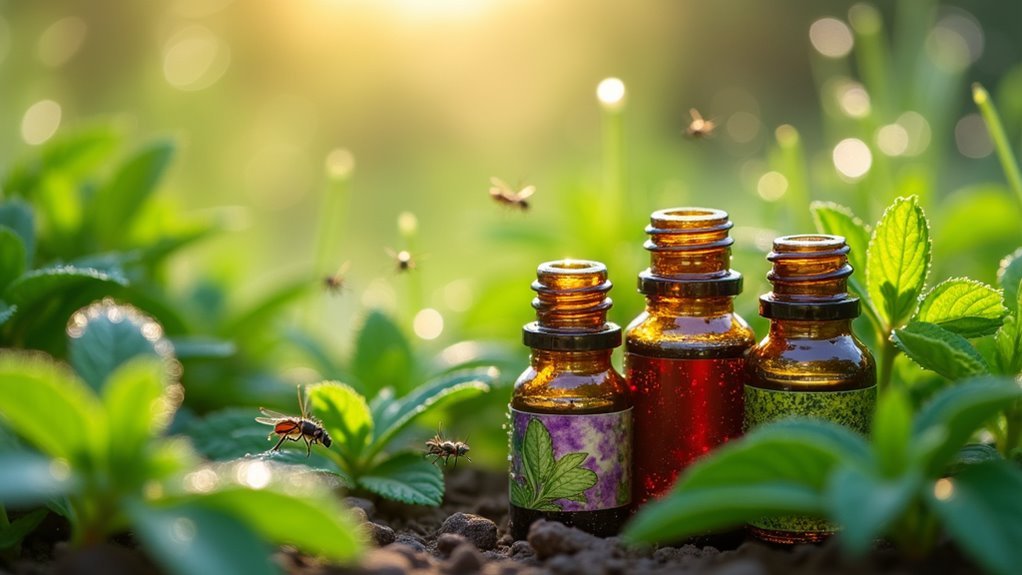
When you’re dealing with persistent garden pests, essential oils offer a natural solution that works by disrupting insect behavior at the molecular level.
These powerful plant extracts contain active compounds like terpenes and phenols that interfere with insects’ nervous systems and sensory receptors, making your garden an unwelcome environment for unwanted visitors.
These natural compounds target insect nervous systems directly, transforming your garden into an environment that pests instinctively avoid.
Essential oils repel pests through multiple mechanisms. The strong aromatic compounds overwhelm insects’ ability to locate food sources and breeding sites, while specific molecules can actually cause neurological disruption in smaller pests.
When you apply oils like peppermint or clove, you’re fundamentally creating an invisible barrier that garden pests find intolerable. This natural approach targets their fundamental survival instincts without harming your plants or beneficial insects.
Top Essential Oils for Controlling Aphids and Small Insects
You’ll find that certain essential oils stand out as particularly effective weapons against aphids and other small garden pests.
Peppermint oil disrupts aphid feeding patterns with its potent scent, while lavender provides broad-spectrum protection without harming beneficial insects.
Clove oil’s eugenol content delivers direct insecticidal action, making these three oils your go-to arsenal for natural pest control.
Peppermint Oil Benefits
Peppermint oil stands out as one of nature’s most powerful weapons against common garden pests like aphids, flies, beetles, and spiders. Its active compounds, menthol and menthone, create an effective barrier that insects actively avoid. A 2016 study confirmed flies consistently stayed away from peppermint-treated areas, proving its repelling capabilities.
| Application | Frequency | Benefits |
|---|---|---|
| Water + Castile soap spray | Every 1-2 weeks | Long-lasting protection |
| Direct application | As needed | Immediate pest control |
| Preventive treatment | Monthly | Ongoing garden health |
| Seasonal application | Spring/Summer | Peak pest season coverage |
You’ll appreciate how peppermint oil doesn’t just repel pests in the garden—it enhances your garden’s aroma while maintaining ecological balance. This biodegradable solution targets harmful insects without affecting beneficial ones.
Lavender Pest Control
Another powerhouse in natural pest management, lavender essential oil delivers dual benefits that make it invaluable for gardeners seeking effective, eco-friendly solutions.
You’ll find it effectively repels aphids, squash bugs, and whiteflies through its natural insecticidal properties. While deterring harmful pests, lavender’s pleasant aroma attracts beneficial pollinators like butterflies to your garden.
For enhanced pest control, mix lavender with peppermint and rosemary oils to create a broader spectrum protection against various insects. Simply combine it with water in a spray bottle and apply directly to affected plants.
You’ll need to reapply after rain or watering for continued effectiveness.
Studies show lavender’s active compounds disrupt pest lifecycles, making it a proven natural alternative to chemical pesticides for extensive garden protection.
Clove Oil Applications
While lavender provides excellent protection against larger garden pests, clove oil excels at targeting smaller, more persistent insects like aphids.
This clove essential oil contains eugenol, delivering powerful insecticidal properties that effectively disrupt pest life cycles and reduce populations.
You’ll achieve superior results by following these application methods:
- Direct spray treatment – Dilute clove oil and apply directly to affected plants for immediate aphid control
- Combination therapy – Mix with peppermint or lavender oils for enhanced broad-spectrum effectiveness
- Regular seasonal application – Apply consistently during peak pest seasons for continuous protection
- Targeted beneficial insect preservation – Focus applications on problem areas while protecting helpful garden insects
Studies demonstrate that clove oil considerably decreases aphid survival rates, making it an excellent pest repellent for managing pests and diseases naturally.
Peppermint Oil: The Ultimate Ant and Rodent Deterrent
You’ll find peppermint oil stands as one of nature’s most powerful deterrents against ants and rodents in your garden.
The menthol and menthone compounds create an overwhelming scent barrier that these pests can’t tolerate, forcing them to seek alternative locations.
When you properly dilute and apply this essential oil around problem areas, you’re creating an effective, chemical-free defense system that protects your plants while adding a revitalizing aroma to your outdoor space.
Natural Ant Prevention
When ants begin marching through your garden beds and along plant stems, peppermint oil offers a powerful natural solution that stops them in their tracks. This essential oil contains menthol, which acts as a strong repellent that’ll keep ants away from your precious plants.
You can effectively reduce pest pressure by diluting peppermint oil and spraying it around entry points.
Here’s how to maximize your ant prevention strategy:
- Dilute properly – Mix peppermint oil with water before application
- Target entry points – Spray around plant bases and garden borders
- Apply regularly – Reapply every 1-2 weeks for consistent protection
- Monitor effectiveness – Watch for reduced ant activity after treatment
This natural approach protects your ecosystem while maintaining a pest-free garden environment.
Rodent Repelling Properties
Peppermint oil’s pest-fighting power extends far beyond ants to effectively repel mice, rats, and other garden rodents. The menthol and menthone compounds in peppermint essential oil create an overwhelming scent that disrupts rodents’ sensitive sense of smell, making them avoid treated areas entirely.
Studies confirm this effectiveness—a 2016 research showed flies actively avoided peppermint oil, demonstrating its broad repellent capabilities against various garden pests.
You’ll maximize results by combining peppermint oil with liquid Castile soap for enhanced potency. Apply this mixture regularly around entry points and garden perimeters where rodents typically enter.
The consistent application creates an invisible barrier that keeps mice and rats away, protecting your plants while maintaining a natural, chemical-free approach to pest control in your garden space.
Application and Dilution
Proper dilution transforms concentrated peppermint essential oil into a safe, effective garden pest deterrent that won’t harm your plants.
You’ll create the perfect application mixture by following this proven recipe that maximizes pest-repelling power while protecting your garden.
Mix your peppermint oil solution using these precise measurements:
- Add up to 20 drops of peppermint oil to a 4-ounce glass spray bottle.
- Include 1 ounce of liquid Castile soap as an emulsifier.
- Pour in 3 ounces of water to complete the mixture.
- Shake thoroughly before each application.
Always conduct a patch test on one leaf before widespread use.
Apply your spray bottle solution every 1-2 weeks for prevention or every few days for active infestations, preferably during cooler evening hours for ideal effectiveness.
Lavender Essential Oil for Natural Pest Prevention
Among nature’s most versatile defenders, lavender essential oil stands out as a powerful ally in your fight against garden pests. This natural insecticide effectively repels aphids, squash bugs, whiteflies, and ants while simultaneously attracting beneficial butterflies to boost your garden’s biodiversity.
You’ll appreciate lavender’s dual-purpose nature—its soothing aroma creates a pleasant garden environment while deterring unwanted insects. For enhanced effectiveness, combine lavender with peppermint and rosemary oils to target a broader pest spectrum.
Apply the oil directly as a spray on and around plant leaves, providing a non-toxic alternative to harsh chemicals.
Remember to reapply regularly, especially after rainfall, to maintain consistent protection. This approach guarantees your garden remains pest-free while supporting environmental health.
Tea Tree Oil’s Antifungal and Antibacterial Properties
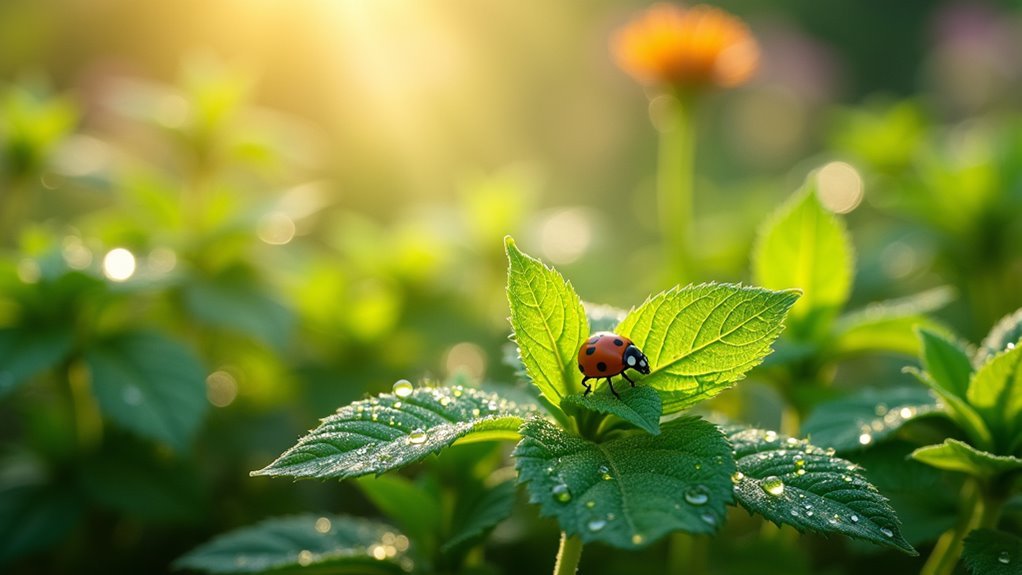
While lavender excels at pest deterrence, tea tree oil takes your garden protection to the next level by targeting fungal and bacterial diseases that threaten plant health.
Tea tree’s powerful antifungal properties make it highly effective against common plant diseases like powdery mildew and root rot.
You’ll benefit from tea tree oil’s all-encompassing disease-fighting capabilities:
- Cellular disruption – It breaks down harmful fungi’s cellular membranes, stopping disease progression
- Bacterial protection – Its antibacterial properties shield plants from bacterial infections
- Preventive foliar spray – Regular application prevents fungal infections before they start
- Chemical-free solution – Maintains healthier garden ecosystems without harsh chemicals
Apply diluted tea tree oil regularly as a foliar spray to promote vigorous growth and enhance your plants’ natural resilience against pathogens.
Clove and Citrus Oils Against Flying Insects
Beyond treating soil-based diseases, clove essential oil and citrus oils target the aerial battlefield where flying insects pose constant threats to your garden’s health.
Clove essential oil’s high eugenol content disrupts mosquitoes’ and flies’ nervous systems, reducing flying insect populations by up to 90% when combined with other natural repellents.
Citrus oils like sweet orange and lemon contain limonene, delivering powerful insect-repelling properties that effectively deter aphids and whiteflies.
These oils offer dual benefits—citrus oils also provide fungicidal protection against mold and mildew diseases.
You can create an effective DIY spray by mixing either oil with water and mild soap, ensuring safe plant application while targeting harmful flying pests throughout your garden.
Creating Effective Essential Oil Spray Solutions
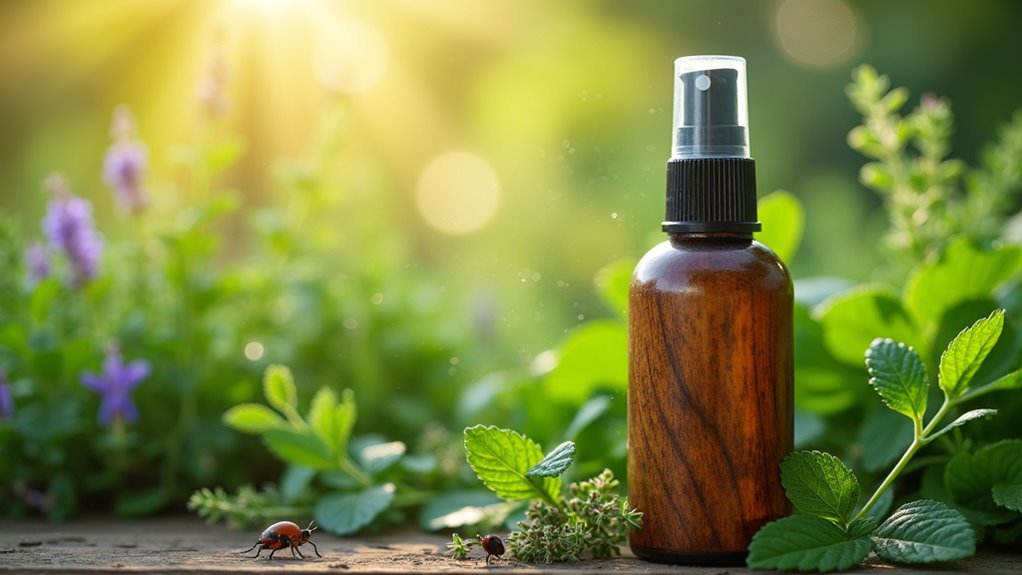
You’ll need to select the right essential oils and combine them properly to create spray solutions that actually repel garden pests.
Start by choosing proven repellent oils like clove, peppermint, and lavender, then mix them at the correct ratios with water and a small amount of dish soap for better plant adhesion.
Your application timing and technique will determine whether the spray protects your plants effectively or causes unwanted damage.
Essential Oil Selection
Three key factors determine the success of your essential oil pest control strategy: purity, potency, and proper selection.
You’ll need 100% pure and natural essential oils to guarantee maximum effectiveness and safety for both your plants and beneficial insects.
When choosing essential oils for pest control, focus on these proven options:
- Peppermint – Effectively repels aphids and mosquitoes with its strong menthol scent
- Lavender – Deters moths, fleas, and flies while being gentle on plants
- Clove – Targets ants, aphids, and various crawling insects
- Cedarwood – Repels moths, beetles, and other wood-boring pests
Each essential oil targets specific pests, so you’ll want to identify your garden’s particular problems before making selections.
Combining multiple oils often creates more thorough protection than using single varieties alone.
Mixing and Application
Once you’ve selected your target oils, creating an effective spray solution requires precise measurements and proper technique.
For ideal mixing, combine 10 drops of clove oil, 20 drops of peppermint oil, and 10 drops each of cedarwood and lavender oils with 2 cups of water or vinegar. Add 5 drops of dish soap to enhance adherence to plant surfaces.
Always shake the mixture thoroughly before each application to guarantee proper blending. Apply during early morning or late evening when temperatures are cooler to prevent leaf burn.
Conduct a patch test on a single leaf first to monitor for adverse reactions.
Reapply every few days during active infestations or after heavy rain, as your garden will be pests without this consistent protection when oils wash off.
Proper Dilution Ratios and Application Methods
While essential oils offer powerful pest-deterrent properties, they’ll cause plant damage or prove ineffective if you don’t dilute them properly.
Understanding proper dilution ratios and application methods guarantees you’ll achieve peak results when using essential oils in your garden.
Follow these essential guidelines for safe, effective application:
- Mix the right ratio: Combine 10-20 drops of essential oil with 2 cups of water for peak concentration.
- Add emulsifier: Include mild Castile soap to help oils blend with water and stick to plant surfaces.
- Test first: Apply diluted solution to one leaf and wait 24 hours to check for adverse reactions.
- Time applications wisely: Spray early morning or late evening to prevent leaf burn and maximize effectiveness.
Reapply every 1-2 weeks for prevention, or every few days during active infestations.
Best Timing for Essential Oil Pest Treatments
Knowing how to dilute and apply your essential oil solutions properly sets you up for success, but timing these treatments correctly will make the difference between mediocre and outstanding results.
The best timing for applying essential oils is early morning or late evening when temperatures are cooler. This prevents leaf burn and enhances effectiveness against pests.
Evening applications also protect beneficial insects and pollinators from exposure.
For preventative measures, spray every 1-2 weeks regularly. When dealing with active infestations, you’ll need treatments every few days for 1-2 weeks.
Always reapply after rain or heavy watering since essential oils wash off easily.
Time your treatments strategically around pest activity patterns. Apply before known infestations occur or during peak pest seasons for maximum success rates.
Combining Essential Oils With Organic Gardening Practices
Here’s how to maximize this integration:
- Mix oils into organic fertilizers – Adding peppermint or lavender improves soil health while creating pest-resistant growing conditions.
- Pair with companion planting – Use basil and rosemary oils alongside strategic plant placement to attract beneficial insects.
- Create preventative fungal treatments – Apply tea tree and clove oils regularly to complement soil health practices.
- Develop custom DIY sprays – Tailor essential oil solutions for specific pest problems without chemical pesticides.
This approach reduces your reliance on harmful chemicals while promoting sustainable organic gardening practices.
Safety Considerations When Using Essential Oils in Gardens
Integrating natural oils into your organic garden requires careful attention to proper handling and application methods.
You’ll need protective gear like gloves and masks when handling concentrated essential oils to prevent skin irritation and respiratory problems. Always dilute oils properly before application, as undiluted concentrations can burn leaves and damage plant tissues. Test treatments on small plant sections first to check for adverse reactions before widespread use.
For maximum safety, apply treatments during cooler periods like early morning or evening to prevent heat-related foliage damage.
Choose 100% pure, natural essential oils without harmful additives that could damage plants or contaminate your garden environment. These precautions guarantee effective pest control while maintaining plant health and personal safety.
Frequently Asked Questions
What Essential Oils Are Good for Pest Control in the Garden?
You’ll find peppermint, lavender, clove, and tea tree oils work effectively against garden pests. Combine rosemary, peppermint, and lavender in DIY sprays to repel aphids, flies, beetles, and other harmful insects naturally.
What Is the Best Oil for Garden Pests?
You’ll find peppermint essential oil works best for garden pests since it’s highly effective against aphids, flies, beetles, and spiders. Its strong menthol compounds create a powerful deterrent that protects multiple plant varieties.
What Can I Spray on My Vegetable Garden to Keep Bugs Away?
You can spray a DIY mixture of peppermint, clove, and lavender essential oils with water on your vegetable garden. Add Castile soap for better adhesion and reapply regularly, especially after rain.
Can I Spray My Plants With Essential Oils?
You can spray your plants with essential oils to repel pests effectively. Dilute them properly with water and natural soap, test on small sections first, and apply during cooler hours to prevent damage.
In Summary
You’ll find essential oils offer an effective, natural solution for garden pest control when you understand proper application techniques. Start with peppermint for ants, lavender for general prevention, and tea tree for fungal issues. Remember to dilute correctly and apply during ideal timing windows. You’re creating a healthier garden ecosystem while protecting beneficial insects. Always prioritize safety and combine these methods with other organic practices for maximum effectiveness in your pest management strategy.

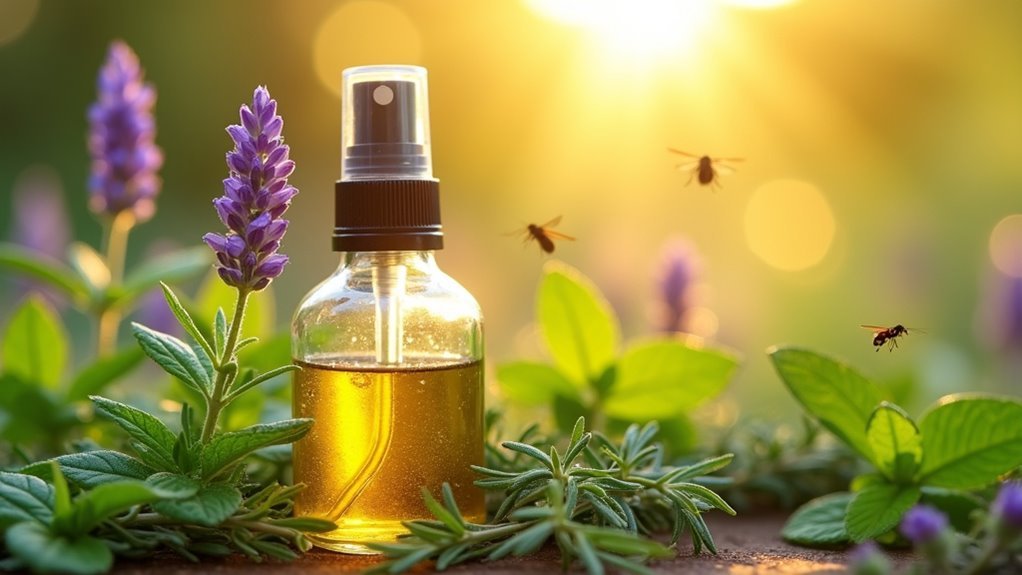
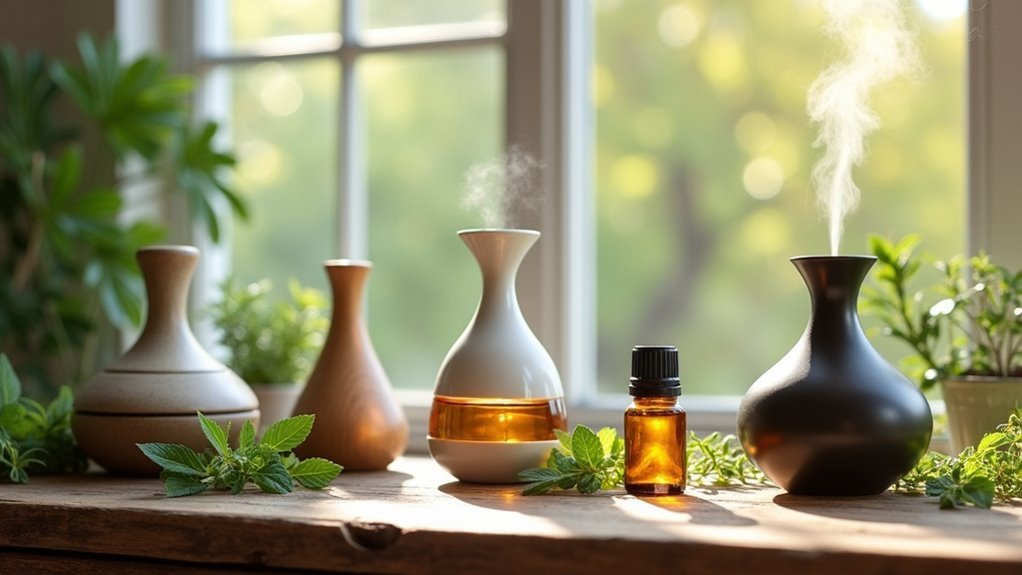
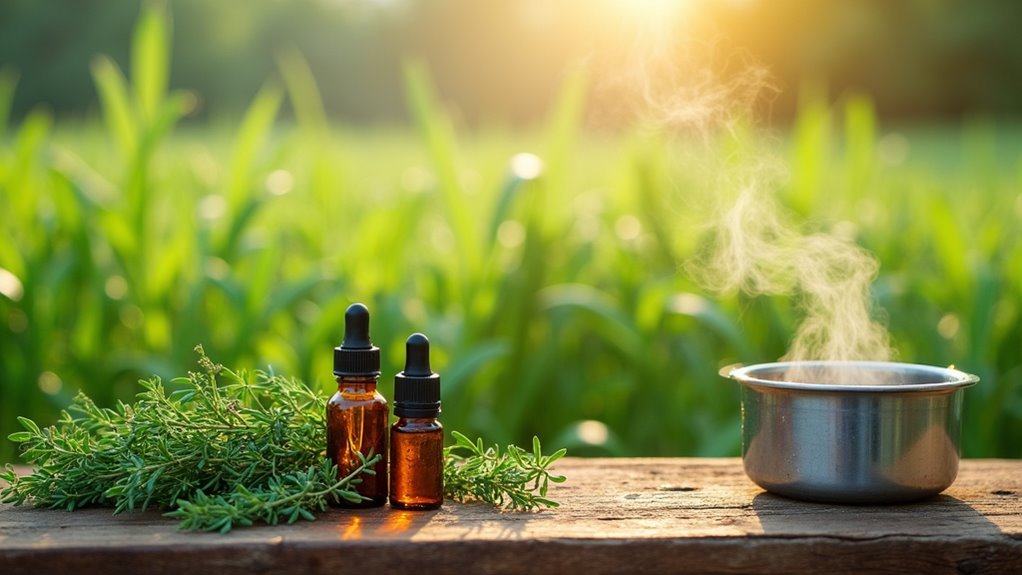
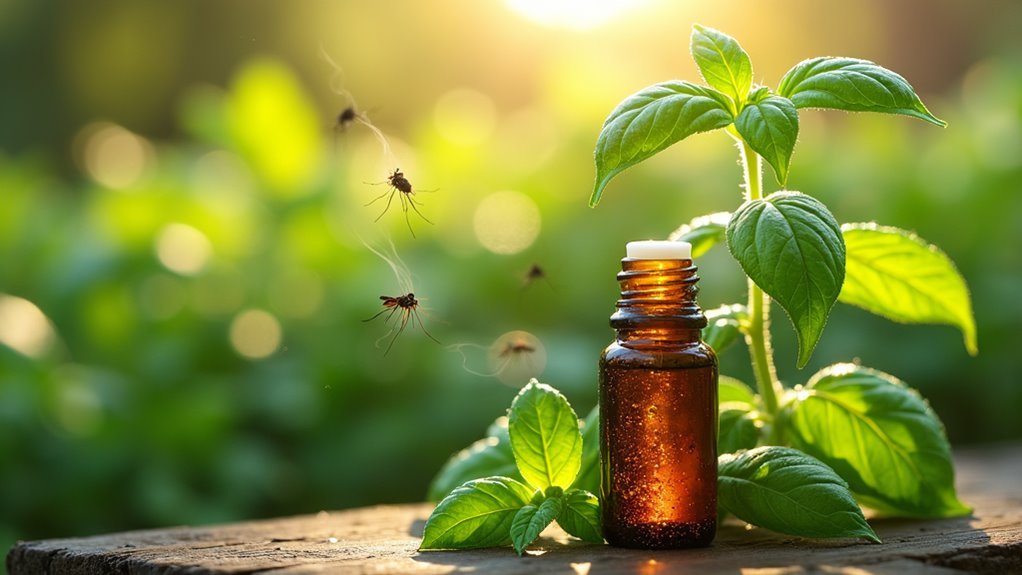
Leave a Reply